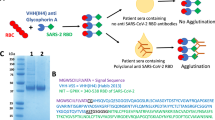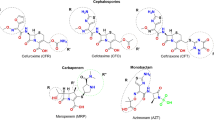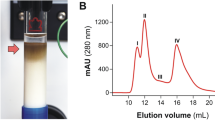Abstract
IN an attempt to define the properties of the enzyme present in the filtrate of a culture of vibrio cholera, which causes cells sensitized with an 'incomplete' anti-Rh antibody to agglutinate1, cultures of other organisms and pure enzyme preparations have been tested. During this investigation trypsin has been found to cause agglutination of cells sensitized with an 'incomplete' antibody, and also to enhance the specific agglutination of other hæmagglutinins in the absence of any detectable antibody of the 'incomplete' type.
This is a preview of subscription content, access via your institution
Access options
Subscribe to this journal
Receive 51 print issues and online access
$199.00 per year
only $3.90 per issue
Buy this article
- Purchase on Springer Link
- Instant access to full article PDF
Prices may be subject to local taxes which are calculated during checkout
Similar content being viewed by others
References
Pickles, M. M., Nature, 158, 880 (1946).
Delezene, C., and Pozerski, E., C.R. Soc. Biol. Paris, 55, 327 (1903).
Weiner, A. S., Proc. Soc. Biol. Exp. and Med., 56, 173 (1944).
Coombs, R. R. A., Mourant, A. E., and Race, R. R., Brit. J. Exp. Path., 26, 255 (1945).
Author information
Authors and Affiliations
Rights and permissions
About this article
Cite this article
MORTON, J., PICKLES, M. Use of Trypsin in the Detection of Incomplete Anti-Rh Antibodies. Nature 159, 779–780 (1947). https://doi.org/10.1038/159779b0
Issue Date:
DOI: https://doi.org/10.1038/159779b0
This article is cited by
-
Relationship between thromboplastin factor of erythrocytes and the surface of the cell membrane
Bulletin of Experimental Biology and Medicine (1974)
-
Serologische Untersuchungen mit enzymbehandelten Erythrozyten zur Frage partieller Antigen-gemeinschaften im Rh-System
Blut Zeitschrift für die Gesamte Blutforschung (1973)
Comments
By submitting a comment you agree to abide by our Terms and Community Guidelines. If you find something abusive or that does not comply with our terms or guidelines please flag it as inappropriate.



